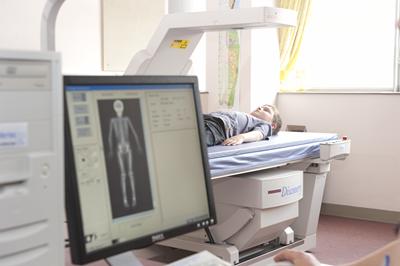Early epigenetic switches associated with childhood bone health

The health of children’s bones could be determined before they are born, a new University of Southampton study has shown.
Researchers from the MRC Lifecourse Epidemiology Unit and the Institute of Developmental Sciences at the University of Southampton, as part of the Epigen Global Consortium, looked at whether bone health might be influenced by epigenetic modifications of DNA early in life.
The results, published in the Journal of Bone and Mineral Research, provide an insight into the early determinants of skeletal growth, and improve the understanding of how osteoporosis could be prevented in future generations.
There is growing evidence that whether genes are expressed or not (switched on or off) in particular human cells can change throughout life and can be affected by a range of environmental factors even before birth, such as their parents’ health, diet and lifestyle before and during pregnancy. This switching on or off of genes is known as “epigenetic modification” and an important epigenetic mechanism is DNA methylation.
The Southampton researchers analysed the levels of DNA methylation in umbilical cord tissue of 669 babies born in the Southampton Women’s Survey.
They compared the DNA methylation levels in the CDKN2A gene to the bone mass of the child at four and six years of age, measured using DXA bone densitometry. They found that higher DNA methylation in particular parts of the CDKN2A gene, which is known to play a role in development and ageing, was associated with lower bone mass at four and six years.
Analysis showed that a 10 percent increase in methylation was associated with a decrease in total bone mass of around 4-9g at age four years. Further laboratory analysis showed that methylation of the CDKN2A region is important for the function and survival of bone cells.
Nicholas Harvey, Professor of Rheumatology and Clinical Epidemiology at the University of Southampton, led the study with Dr Elizabeth Curtis, Wellcome Trust Clinical Research Fellow, and Dr Robert Murray, Postdoctoral Research Fellow, both also from the University.
He said: “The health of a child’s bone when they are young can influence the risk of osteoporosis in older age. This study provides exciting insights into the role of epigenetics in bone health, and might allow us to more accurately predict an individual’s future risk of osteoporosis. Our ongoing studies should enable us to work out whether interventions during pregnancy, for example vitamin D supplementation, will actually alter the epigenetic marks, and lead to improved bone health in the offspring.”
Professor Cyrus Cooper, Director of the MRC Lifecourse Epidemiology Unit, said: "This major finding links our previous observations on maternal nutrition and lifestyle during pregnancy, with the later risk of musculoskeletal ageing in the offspring. It bears testimony to the value of large, well-maintained population cohorts, participants among whom are followed up for many years.”
The EpiGen Global Consortium brings together expertise from the Human Development and Health Academic Unit, MRC Lifecourse Epidemiology Unit and Centre for Biological Sciences, University of Southampton; Singapore Institute for Clinical Sciences; National University of Singapore; Auckland UniServices Limited and the Liggins Institute, University of Auckland. The Consortium’s aim is to improve human health through the life course by further understanding developmental and environmental processes. The research includes a focus on epigenetics, the biology of understanding how gene function is regulated by environmental factors, such as maternal nutrition, during the very early stages of development. This research was carried out as part of a collaboration with the Nestlé Research Centre, in Lausanne, Switzerland.

